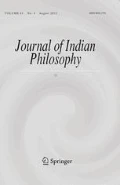Abstract
The aim of this paper is to clarify how Śālikanātha’s epistemology can be distinguished from that of Dharmakīrti, especially in terms of their respective views on cognitive form (ākāra). It has been pointed out that Śālikanātha’s tripuṭī theory and svayaṃprakāśa theory are very close to Dharmakīrti’s epistemology. However, it remains questionable if Śālikanātha, who belongs to the Prābhākara branch of the Mīmāṃsā and is therefore a nirākāravādin, can subscribe to notions that Dharmakīrti developed on the basis of sākāravāda. The present paper concludes that Śālikanātha agrees with Dharmakīrti in assuming that a single cognition consists of three parts; unlike Dharmakīrti, however, Śālikanātha puts emphasis on the difference between these parts, especially between the cognition and its form, on the ground that the cognitive form belongs to the external thing, and not to the cognition (nirākāravāda). In Dharmakīrti’s epistemology, the cognitive form belongs to cognition (sākāravāda); in the ultimate level, there remains no difference between the three parts.
Similar content being viewed by others
Abbreviations
- em.::
-
emended
- n. e.::
-
not existent
References
Primary Sources
ṚV: Ṛjuvimalāpañcikā of Śālikanātha. See B (Bṛhatī).
DAṬ: Jambuvijaya, Muni (Ed.). (2001). Ācārya Rāmacandra and Guṇacandra’s Dravyālaṅkāra. With Autocommentary. Ahmedabad.
NBṬ: Mālvaṇiyā, D. (Ed.). (1971). Paṇḍita Durveka Miśras Dharmottarapradīpa. [Being a subcommentary of Dharmottaras Nyāyabinduṭīkā, a commentary on Dharmakīrtis Nyāyabindu]. Patna: Kashi Prasad Jayaswal Research Institute.
NS: Nyāyasiddhi of Jayapurī Nārāyaṇa Bhaṭṭa. See PrP (EB).
PrP(E C ): Sastri, M. (Ed.). (1904). Prakaraṇapañcikā of Śālikanātha, Prakaraṇapañcikā nāma Prabhākaramatānusāri-Mīmāṃsādarśanam. Benares.
PrP(E P ): Sastri, V., & Sarma, V. (Eds.). (1866). Prakaraṇapañcikā of Śālikanātha, the Pratyakṣapariccheda of the Pramāṇapārāyaṇa section. The Pandit, 1, 4–7. Benares.
PrP(E B ): Sastri, A. (Ed.). (1961). Prakaraṇapañcikā of Sri Śālikanāthamiśra with Nyāya-siddhi. Benares.
PrP(M M ): Manuscript of the Pramāṇapārāyaṇa section preserved in Oriental Research Institute Mysore (ORI): C.1538/2, Devanāgarī, paper, incomplete, 57 folios.
PrP(M N ): Manuscript of Pramāṇapārājikā (sic; of the whole PrP). Nepal-German Manuscript Preservation Project (NGMPP): B0056/03, Devanāgarī, paper, complete, 164 folios.
PV 3: Pramāṇavārttika of Dharmakīrti, chapter on perception (pratyakṣa). See Tosaki 1979 (vv. 1–319) and Tosaki 1985 (vv. 320–539).
PVin 1: Steinkellner, E. (Ed.). Dharmakīrti’s Pramāṇaviniścaya. Chapters 1 and 2. Beijing/Vienna: China Tibetology Publishing House/Austrian Academy of Sciences Press 2007. For Corrigenda, cf. Wiener Zeitschrift für die Kunde Südasiens 51 (2007–2008) 207–208, as well as http://ikga.oeaw.ac.at/Mat/steinkellner07_corrigenda.pdf (last accessed 14 January 2009).
PVP: Pramāṇavārttikapañjikā of Devendrabuddhi. Tibetan translation: Tshad ma rnam ‘grel gyi dka’ ‘grel, translated by Subhūtiśrī(śānti) and (rMa) dGe ba’i blo gros. D 4217, Che 1b1-326b4; P 5717, Che 1-390a8.
B: Sastri, S. K. R. (Ed.). (1934). Bṛhatī of Prabhākara Miśra with the Ṛjuvimalāpañcikā of Śālikanātha [Tarkapāda]. Madras.
MBhP: Sastri, S. K. R. (Ed.). (1936). Bṛhatī of Prabhākara Miśra with the Bhāśyapariśiṣṭa of Śālikanātha [Tarkapāda]. Madras.
ŚBh: Frauwallner, E. (Ed.). (1968). Śabarasvāmi’s Bhāṣyam zu den Mīmāṃsāsūtren I.1,1–5. In E. Frauwallner, Materialien zur ältesten Erkenntnislehre der Karmamīmāṃsā (pp. 7–61). Wien: Österreichische Akademie der Wissenschaften.
Secondary Sources
Bandyopadhyay, N. (2003). Definition of pramāṇa (Pramāṇapārāyanṇa in the Prakaraṇapañcikā). Kolkata.
Chatterjee T. (1979) Did Prabhākara hold the view that knowledge is self-manifesting?. Journal of Indian Philosophy, 7(3): 267–276
Hiriyanna, M. (1972). Indian philosophical studies II. Mysore.
Iwata T. (1991) Sahopalambhaniyama. Struktur und Entwicklung des Schlusses von der Tatsache, daß Erkenntnis und Gegenstand ausschließlich zusammen wahrgenommen werden, auf deren Nicht verschiedenheit (Vol. 2). Franz Steiner, Stuttgart
Jha, M. G. (1911). The Prābhākara school of Pūrva Mīmāṃsā. Delhi (reprint 1978).
Kuroda H. (1982) Prakaraṇapañcikā kenkyū (III) Śālikanātha no ninshikiron no ichisokumen. Indogakubukkyōgaku kenkyū, 31(1): 38–40
Kuroda H. (1989) Kyū-Prabhākara ha ni tsuite. Indo shisōshi kenkyū, 6: 77–94
Matilal B.K. (1986) Perception. An essay on classical Indian theories of knowledge. Clarendon Press, Oxford
Pandurangi, K. T. (2004). Prakaraṇapañcikā of Śālikanātha with an exposition in English. New Delhi.
Shastri N. (1967) Cognition (Jñāna) according to Prabhākara Miśra. Vishveshvaranand Indological Journal, 5: 71–76
Taber J. (2005) A Hindu critique of Buddhist Epistemology. Kumārila on perception. The “Determination of Perception” chapter of Kumārila Bhaṭṭa’s Ślokavārttika. Translation and Commentary. London/New York, RoutledgeCurzon
Tosaki, H. (1979). Bukkyōninshikiron no kenkyū. Jōkan {*Studies in Buddhist Epistemology, Vol. 1}. Tōkyō: Daitōshuppansha.
Tosaki, H. (1985). Bukkyōninshikiron no kenkyū. Gekan {*Studies in Buddhist Epistemology, Vol. 2}. Tōkyō: Daitōshuppansha.
Yoshimizu K. (1997) Der Organismus des urheberlosen Veda. Eine Studie der Niyoga-Lehre Prabhākaras mit ausgewählten Übersetzungen der Bṛhatī. Publications of the De Nobili Research Library, Wien
Author information
Authors and Affiliations
Corresponding author
Rights and permissions
About this article
Cite this article
Kyuma, T. Śālikanātha’s Criticism of Dharmakīrti’s svasaṃvedana Theory. J Indian Philos 38, 247–259 (2010). https://doi.org/10.1007/s10781-010-9097-5
Published:
Issue Date:
DOI: https://doi.org/10.1007/s10781-010-9097-5



